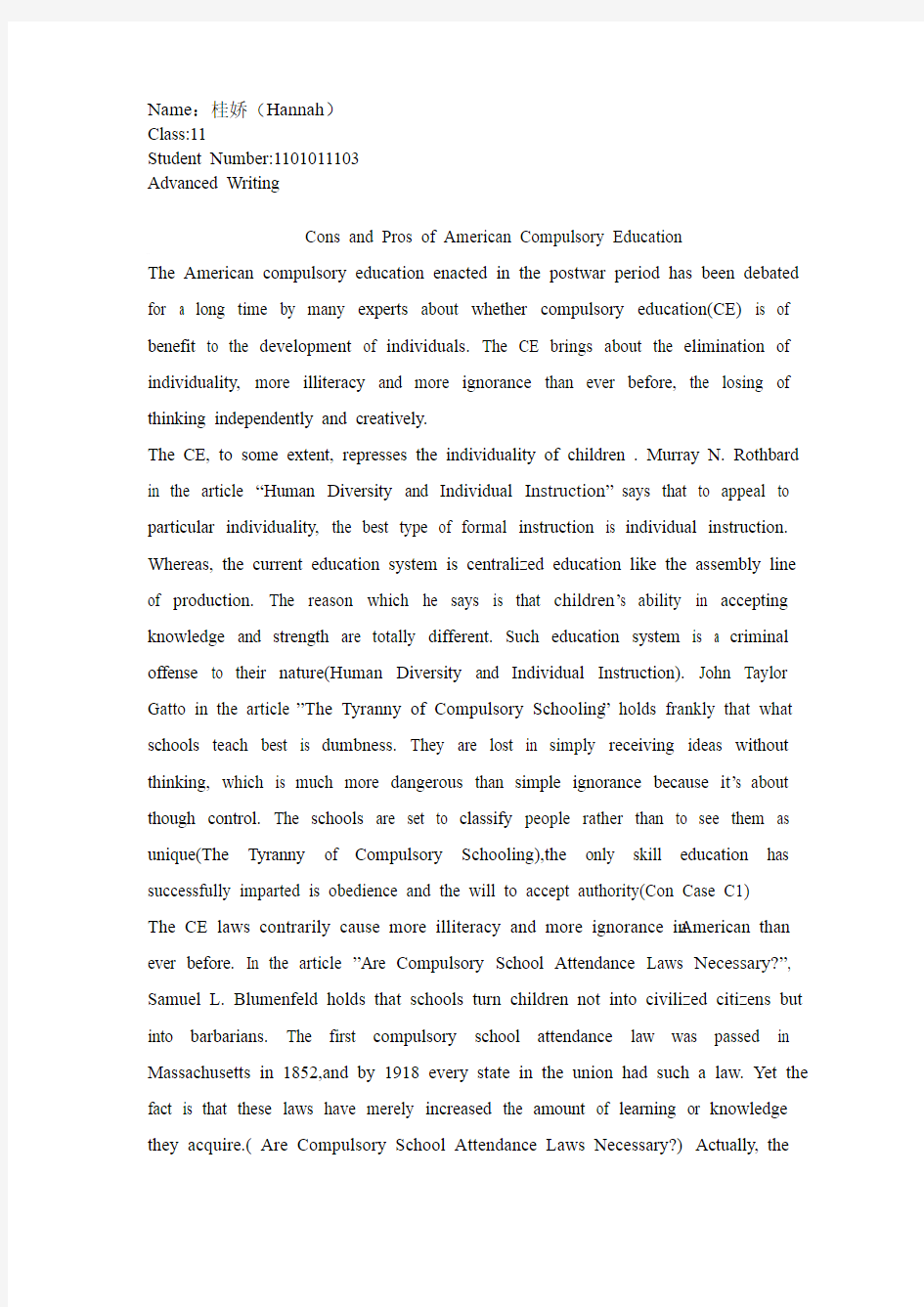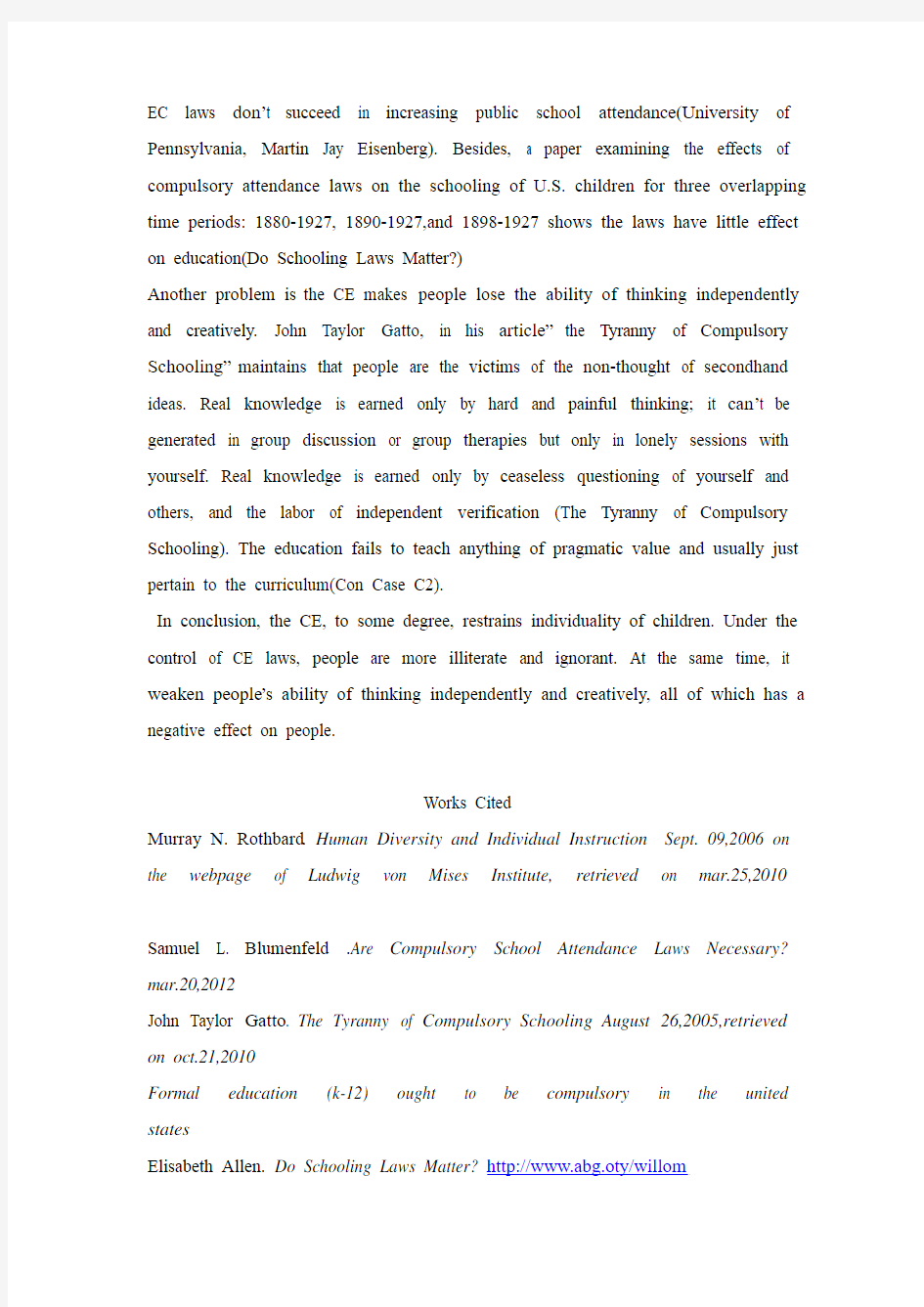Cons and pros of American compulsory education


Name:桂娇(Hannah)
Class:11
Student Number:1101011103
Advanced Writing
Cons and Pros of American Compulsory Education
The American compulsory education enacted in the postwar period has been debated for a long time by many experts about whether compulsory education(CE) is of benefit to the development of individuals. The CE brings about the elimination of individuality, more illiteracy and more ignorance than ever before, the losing of thinking independently and creatively.
The CE, to some extent, represses the individuality of children . Murray N. Rothbard in the article “Human Diversity and Individual Instruction”says that to appeal to particular individuality, the best type of formal instruction is individual instruction. Whereas, the current education system is centralized education like the assembly line of production. The reason which he says is that children’s ability in accepting knowledge and strength are totally different. Such education system is a criminal offense to their nature(Human Diversity and Individual Instruction). John Taylor Gatto in the article ”The Tyranny of Compulsory Schooling” holds frankly that what schools teach best is dumbness. They are lost in simply receiving ideas without thinking, which is much more dangerous than simple ignorance because it’s about though control. The schools are set to classify people rather than to see them as unique(The Tyranny of Compulsory Schooling),the only skill education has successfully imparted is obedience and the will to accept authority(Con Case C1) The CE laws contrarily cause more illiteracy and more ignorance in American than ever before. In the article ”Are Compulsory School Attendance Laws Necessary?”, Samuel L. Blumenfeld holds that schools turn children not into civilized citizens but into barbarians. The first compulsory school attendance law was passed in Massachusetts in 1852,and by 1918 every state in the union had such a law. Yet the fact is that these laws have merely increased the amount of learning or knowledge they acquire.( Are Compulsory School Attendance Laws Necessary?) Actually, the
EC laws don’t succeed in increasing public school attendance(University of Pennsylvania, Martin Jay Eisenberg). Besides, a paper examining the effects of compulsory attendance laws on the schooling of U.S. children for three overlapping time periods: 1880-1927, 1890-1927,and 1898-1927 shows the laws have little effect on education(Do Schooling Laws Matter?)
Another problem is the CE makes people lose the ability of thinking independently and creatively. John Taylor Gatto, in his article”the Tyranny of Compulsory Schooling”maintains that people are the victims of the non-thought of secondhand ideas. Real knowledge is earned only by hard and painful thinking; it can’t be generated in group discussion or group therapies but only in lonely sessions with yourself. Real knowledge is earned only by ceaseless questioning of yourself and others, and the labor of independent verification (The Tyranny of Compulsory Schooling). The education fails to teach anything of pragmatic value and usually just pertain to the curriculum(Con Case C2).
In conclusion, the CE, to some degree, restrains individuality of children. Under the control of CE laws, people are more illiterate and ignorant. At the same time, it weaken people’s ability of thinking independently and creatively, all of which has a negative effect on people.
Works Cited
Murray N. Rothbard. Human Diversity and Individual Instruction Sept. 09,2006 on the webpage of Ludwig von Mises Institute, retrieved on mar.25,2010
Samuel L. Blumenfeld .Are Compulsory School Attendance Laws Necessary? mar.20,2012
John Taylor Gatto. The Tyranny of Compulsory Schooling August 26,2005,retrieved on oct.21,2010
Formal education (k-12) ought to be compulsory in the united states
Elisabeth Allen. Do Schooling Laws Matter? http://www.abg.oty/willom
John Suler.University of Pennsylvania, Martin Jay Eisenberg
